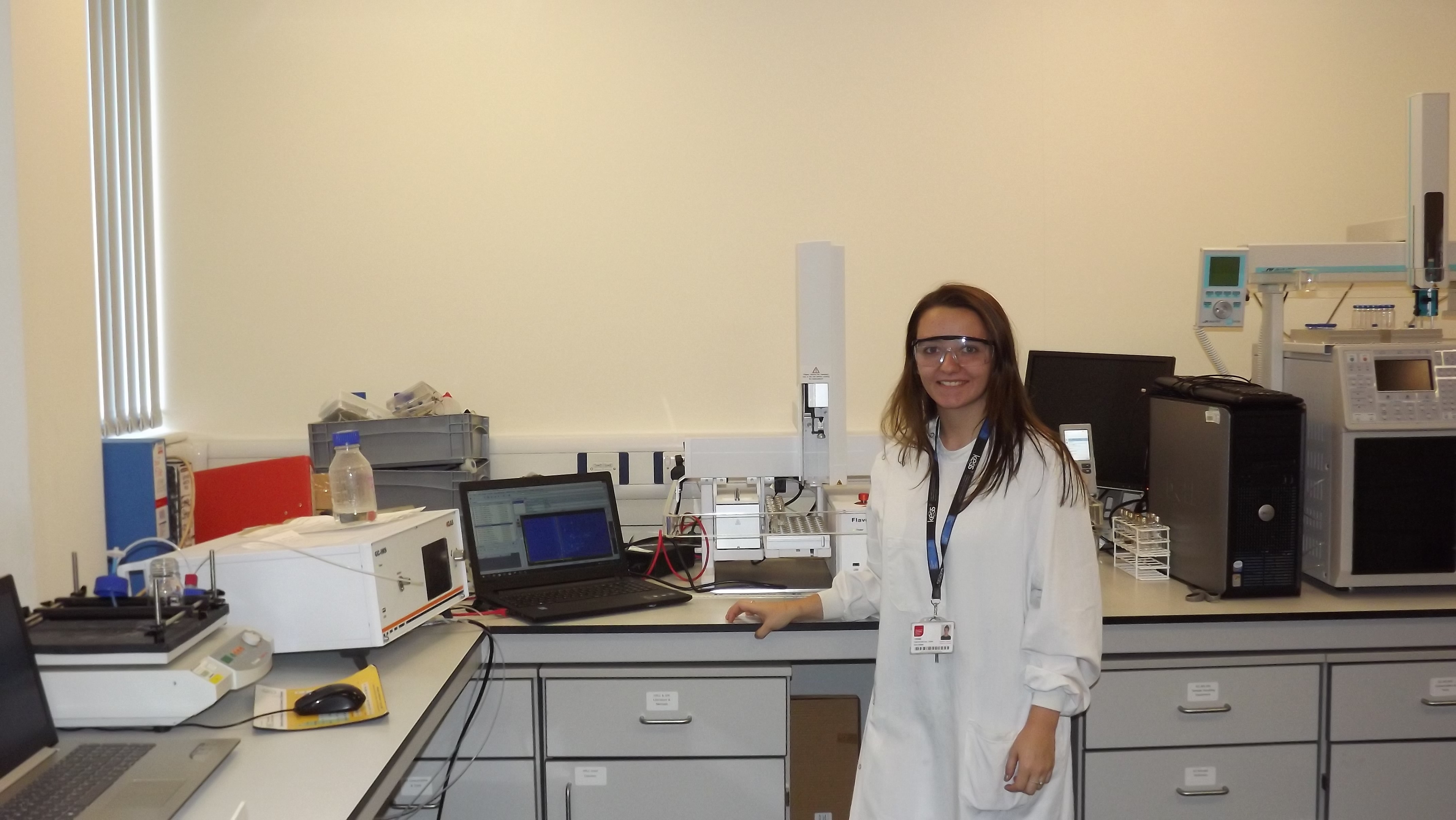
Kirstie Goggin (ESF-funded KESS 2 PhD), was awarded her PhD in an amazing timescale of 3 years 4 months through the KESS 2 Programme, being the first KESS 2 female PhD recipient at USW.
KIRSTIE GOGGIN
A STUDENT’S PERSPECTIVE
My PhD was about developing new chemical and genetic approaches to improve traceability, transparency and authenticity within food supply chains. I focused on palm oil because it was (and still is) so topical, and new methods were urgently required to support current approaches.
Although palm oil is viewed by many as ‘the devil of the tropics’, I found it fascinating to work in this area, and to hear people’s different perceptions. As palm oil is here to stay (as there are many positive sides to the industry that you do not hear about), it is best to advocate sustainable production and to have meaningful and educational conversations, rather than just focus on the negatives.
THE COMPANY PERSPECTIVE
The partner organisation was IMSPEX Diagnostics Ltd, based in Abercynon, Rhondda Cynon Taf. IMSPEX focuses on the continuous development of their GC-IMS analytical instrument platform and its many applications in lab-quality sensitive analysis in the field. Dr Emma Brodrick, who is Applications Manager at IMSPEX, and a KESS 1 alumna, said that IMSPEX were appreciative of Dr Kirstie Goggin and her work, commenting,
“Kirstie has been an excellent student who was always eager to get stuck in, to complete her work ahead of time, and to help IMSPEX as much as possible. She completed her PhD within 3 years and 4 months, and we were so impressed with her attitude and approach, that we now employ her part-time at IMSPEX. For her research, we provided her with the analytical instrument required for her analyses, as well as insider advice on completing a KESS PhD, given that I had done so myself in 2016. Kirstie helped to raise the profile of IMSPEX by driving new applications in the palm oil industry and giving talks at numerous national and international conferences and attending industry events to showcase the instrument and develop new contacts. Most notably, she has published most of her findings in peer-reviewed scientific journals, which has helped to boost our profile amongst the academic community.”
Conducting my research has been a very challenging, but also a very rewarding, process. With the support of my USW supervisors (Prof Denis Murphy, Prof Tony Davies and Dr Jeroen Nieuwland), my industrial partner (IMSPEX Diagnostics Ltd) and company supervisor (Dr Emma Brodrick), KESS 2 and USW, I was able to submit my PhD thesis shortly after the funded period and pass my Viva just 2 months later!
I have collaborated with many overseas partners, one in particular who is now continuing my work through an industrial research project, and two further PhD projects. So far, I have published four papers in peer-reviewed journals; have another two in submission; and another two to write. I hope that people interested in this area of research will read my work and gain some ideas for future research.

Kirstie was shortlisted for the Young Lipid Scientist Award in 2018 and gave a talk at the renowned Campden BRI. She travelled to Belfast to present her work and also won best poster award at a conference held in Prague. View Kirstie’s full poster
IMPACT
IMPROVING PALM QUALITY
Kirstie Goggin and IMSPEX have been able to show that GC-IMS can be used within the palm oil industry to screen for harmful adulterants, which should improve consumer trust and confidence in the industry.
LEADING THE MARKET
The KESS 2 project has enabled IMSPEX to position themselves as a leader in the analysis of palm oil for detecting adulterants and determining geographical origin.
A GROWING PARTNERSHIP LEADING TO LONG-TERM PALM OIL SUPPLY CHAIN IMPROVEMENT
The project has enabled IMSPEX to gain valuable contacts within the palm oil industry. The work is now being carried forward through various academic and industrial research projects over the coming years.
KIRSTIE’S HIGHLIGHTS
I had many fond experiences throughout my time as a KESS 2 student; one of the most challenging at the time was talking to 1000+ sixth form students (pictured below) about the ethical dilemmas of palm oil production. This to me was a personal milestone; because I always had a chronic fear of public speaking and this led me to go on to talk at many more public speaking events. I also knew that when I was doing my Biology A-Level, it would have inspired me to hear from a young, female scientist who was passionate about her research.

Another memorable moment was visiting the Wageningen Food Safety Research laboratories in the Netherlands. These labs are the first port of call for all food safety incidents and a lab geek’s dream! All of the products involved in the 2013 horsemeat scandal were analysed here by food safety experts. I visited to use a PTR-TOF, which is a very expensive, high-tech bit of kit. It was key to my research as it enabled me to confirm my initial findings, which was important for method validation and for publishing purposes. ‘I started to feel like a proper scientist!’

Knowledge Economy Skills Scholarships (KESS 2) is a pan-Wales higher-level skills initiative led by Bangor University on behalf of the HE sector in Wales. It is part-funded by the Welsh Government’s European Social Fund (ESF) convergence programme for West Wales and the Valleys. For further information about how your organisation could benefit from participating in KESS 2, please contact the KESS 2 Central team at Bangor at: kess2@bangor.ac.uk or the USW KESS 2 team at: kess@southwales.ac.uk
The USW KESS 2 team is based within Research and Innovation Services (RISe), part of Research and Business Engagement. RISe is a dedicated team providing specialist support for Research Infrastructure; Postgraduate Research Support; Research Impact; and Income Generation. Visit: http://research.southwales.ac.uk/

Related articles:
Welsh scientists are helping to keep our food healthy, safe and sustainable









